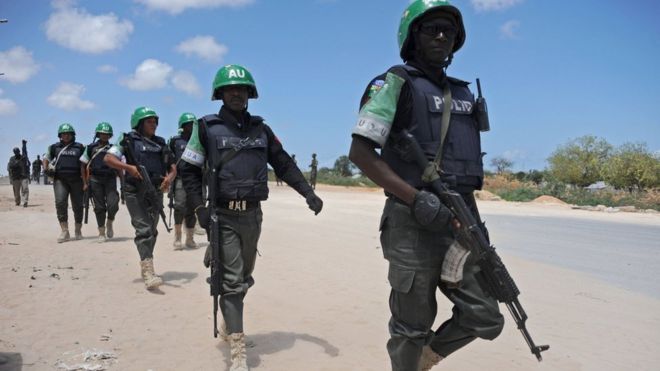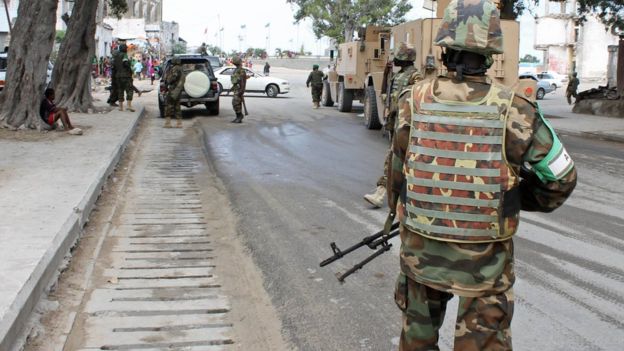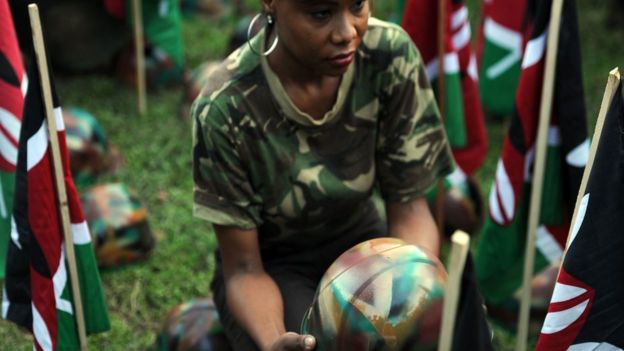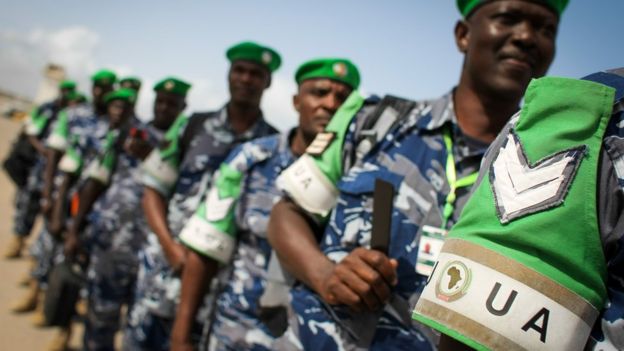 The African Union force in Somalia is facing new questions following last month’s attack on a Kenyan military base, which Al-Shabaab says killed more than 100 soldiers.
The African Union force in Somalia is facing new questions following last month’s attack on a Kenyan military base, which Al-Shabaab says killed more than 100 soldiers.
Kenya’s military has not yet said how many of its soldiers died at the el-Ade base in southern Somalia but it could be one of the biggest ever suffered by the AU force, known as Amisom.
That attack, and the more recent fight for control of the port town of Merca, have confirmed that the militant Islamists are not a spent force despite Amisom being on the ground since 2007.
According to its mandate, it was set up with United Nations backing to “reduce the threat posed by Al-Shabaab” and support the Somali government in regaining control over the country.
But there is still some way to go.
In the wake of the el-Ade attack Amisom troops withdrew from several towns in southern Somalia in what officials called a tactical move.
The region is where Al-Shabaab is believed to be concentrated and it appears to be filling the void.
The attacks on the force that should be protecting the fragile Somali state are a cause for concern for the AU’s decision makers.
The losses suffered by the Kenyan contingent follow similar attacks on Amisom’s Ugandan and Burundian troops last year.
At the recent AU summit in Addis Ababa, Kenya’s President Uhuru Kenyatta called for “more resources for the forces in Somalia”. AFP. The African Union mission has been in Somalia since 2007
AFP. The African Union mission has been in Somalia since 2007
The military men on the ground would no doubt welcome more support but do not shy away from what they are there for.
Visiting the scene of the el-Ade attack, acting force commander Maj Gen Nakibus Lakara emphasised the nature of the campaign.
“Amisom is not a peacekeeping mission [but] a war-fighting mission,” he said.
“In a fight of course there are casualties, but what is important for Amisom is that those casualties are kept to the minimum acceptable.”
But the bigger picture is for the politicians to worry about.
Despite the losses, President Kenyatta insists that his nation remains “unbowed” and will continue its mission in Somalia.
There are some voices in Kenya calling for a withdrawal from Somalia, but the president wants to avoid leaving behind a vacuum in which the jihadists could thrive and pose a greater threat to the region. AFP. Kenyans have been mourning the loss of their soldiers in the el-Ade attack
AFP. Kenyans have been mourning the loss of their soldiers in the el-Ade attack
“This is not the time to waiver or to listen to the voices of defeat and despair,” he recently said.
Some observers say it is not viable to base your foreign policy on trying not to look like a coward.
And there are questions about what the mission in Somalia will look like in the long term.
In its nine years, Amisom has been successful in winning territory by pushing the insurgents out of some regions, providing support for the government and creating an environment suitable for the resurgence of the local economy, but this has not stopped the violence.
“There needs to be a yardstick for measuring success in Somalia,” argues Abdullahi Boru, a Horn of Africa security and policy analyst.
“Military might is not enough,” he says, there also needs to be an effort to “win over the Somali population”, if not then “this fight will be counterproductive”.
The challenge is that not only does Amisom need to convince ordinary Somalis that it serves their interests, but that it is worth them cooperating even if it could make them potential targets for Al-Shabaab reprisals. AFP. Amisom forces need to convince Somalis that it is fighting in their interests
AFP. Amisom forces need to convince Somalis that it is fighting in their interests
The mission also needs to enable the Somali government forces to fight Al-Shabaab on their own and that is “something it currently lacks the capacity to do”, says David Wagacha from the Paradec research consultancy.
But apparent disagreements within Amisom also need to be addressed.
At the moment, Somalia is divided into different sectors – each the responsibility of a different country making up the intervention force.
This has led to some suggestions of there being a lack of harmony.
Mr Wagacha says “in spite of the gains made in liberating some towns from Al-Shabaab, there appears to be some kind of disconnect between some Amisom members, as well as mistrust and egotism.
“This will hinder a cohesive and effective fight against the common enemy.”
There needs to be a thorough review ahead of the UN Security Council’s discussion on extending Amisom’s mandate, with the changes spurred by the deadly January attack.































